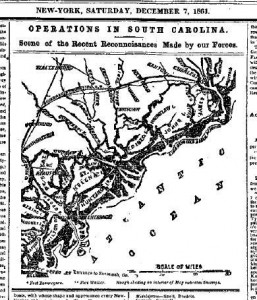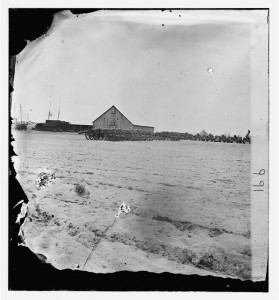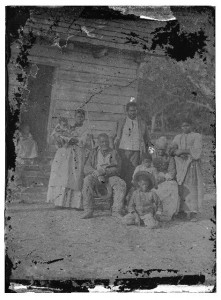Since the Battle of Port Royal Union forces have been sort of making themselves at home along the South Carolina coast. The following article mentions some “reconnoissances”, one of which went as far south as Tybee Island near Savannah, Georgia. One reason I liked this article because it seems to back up some points Stephanie McCurry made in Confederate Reckoning about slaves along the South Carolina coast actively resisting their masters as Union troops advanced.
From The New-York Times December 7, 1861:
OUR PORT ROYAL CORRESPONDENCE.; Important Events of a Few Days The Reconnoissances on the Mainland The Country Deserted by the Whites, from Tybee to Charleston Quntities of Clothes Discovered Fortifications Deserted The Negroes Welcoming the Union Soldiers, &c.
HILTON HEAD, PORT ROYAL, S.C., Sunday, Dec. 1, 1861.
The events of the past few days have not been salient ones; the building of stables for eleven hundred horses, the erection of ordnance storehouses, and the appointment of cemeteries, are scarcely themes that strike the public attention, vastly important as they are to the comfort and safety of the new population landed upon this shore. The throwing up of entrenchments and the mounting of guns are more purely military in their aspect, and a complete description of the changes wrought here by the officers of the engineer and ordnance corps would undoubtedly interest the country, but prudence forbids any such detail. There are left only the reconnoissances, which have been important and extended, and a statement of the results developed by them.
The reconnoissances since my last letter have been a renewed one, under Capt. GILMORE, Chief of Engineers, to Tybee Island, and one westward, half way to Charleston, under Lieut. P.H. O’RORKE …
… Everywhere the whites had deserted their residences, leaving the negroes behind; in several instances they set fire to the cotton-houses at the approach of the Union forces, but with these exceptions, their property remained undisturbed. No pillaging had taken place. National troops were sometimes quartered in gentlemen’s houses, where the furniture of the drawing-rooms was scrupulously guarded from use, and the silver plate that, in their haste, was left on the sideboards, was subjected to no damage. The blacks told the same story here as everywhere else; their masters had fled with the greatest trepidation after the fall of Port Royal; had endeavored to persuade the slaves to accompany them, and had even shot some who refused. But, as elsewhere, the blacks had remained behind, and welcomed the new-comers. For seven miles further inward than it was thought advisable to advance, the whites were said to have abandoned the country.
It is thus definitely ascertained, that from Tybee Island, within a mile and a quarter of Fort Pulaski, up to Otter Point, not much more than thirty miles from Savannah, the entire seaboard of South Carolina is in our hands; her white population fled; her planters’ houses abandoned, and often pillaged by the blacks; the cotton houses frequently burned by the rebels themselves, (sometimes the cotton has been buried,) and the slave population left to take care of itself. The efforts to carry off the slaves have been in nearly every case abortive. No love for masters no fear of their cruelty, no apprehension of the Yankees has been sufficient to alarm the blacks. They all look upon us as friends; and where they do not come within our lines, say that all that restrains them is the dislike of leaving their families and the “tings” — their little property. They have a cat-like clinging to their old quarters, and do not generally manifest any desire to quit them. When they have fled in large numbers, it has been always towards our lines, but so far as I can learn it has been because of the efforts of their masters to take them off. This they resist, but they manifest, no peculiarly vindictive spirit. They complain of bad treatment, but I cannot learn that they display any desire to revenge themselves. They chuckle indeed with infinite glee over Southern disasters; they tell of the lies they told their former owners, of their pretences to love them, of their forced obedience; they believe in the power of the Unionists to overthrow the Southern rule; they are willing to act as guides or scouts, (occasionally;) to work; to give all information; and the more intelligent they are the readier to aid us. But unless provoked by the foolish attempts of the rebels to carry them off, I doubt whether they will attempt any injury to the persons of the whites. The plundering indeed presages evil, but if the rebels set the example by firing their own cotton-houses, they need not be surprised to find it imitated. If they persist in their attempts at forcibly restraining the slaves and in firing at them, the worst consequences are likely to follow.
The health of the command is not so good as might be desired; congestive and typhoid fevers are prevalent, but by no means epidemic. There is, however, a great lack of hospital stores, and I am authoritatively informed that the patriotism and benevolence of those at home could hardly be better employed than in providing additions to these stores. The need for such luxuries as the sick require is pressing, and even bedding, sheets, and other of the more obvious necessities of the hospital have not been furnished. Requisitions have been made for them, but months may elapse before in the official routine the command will be supplied. The women of New-York who feel inclined to devote a portion of their means or their energies to the cause, in behalf of which these men sicken and die, have here a fitting opportunity. The cause of this strange state of affairs is no neglect on the part of the present Medical Director of the command; Dr. GEO. COOPER, who was appointed to his position only a day or two before the expedition sailed from Annapolis. VAGABOND.
And I think VAGABOND is a cool pen name for a correspondent.



